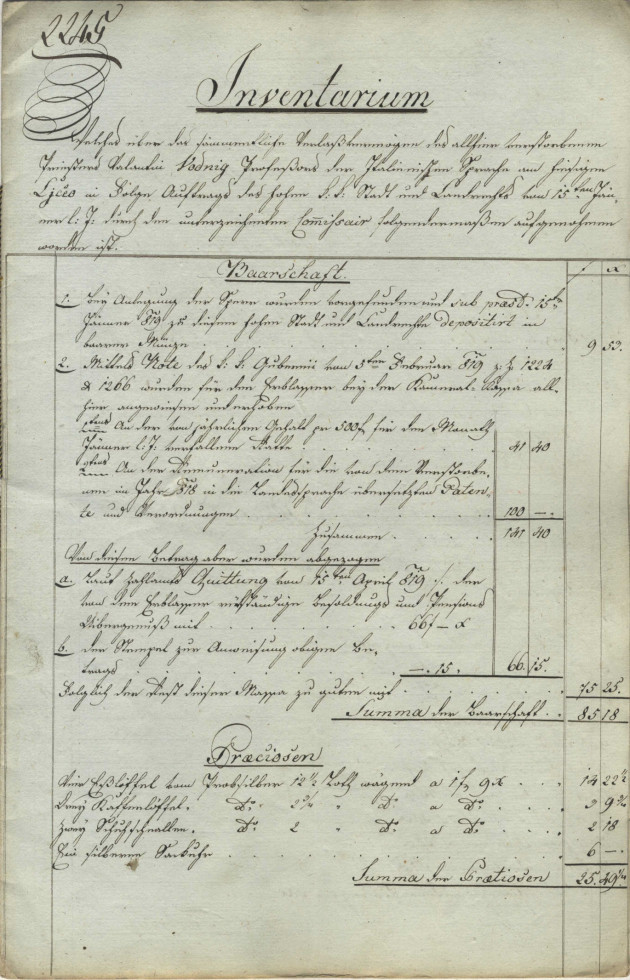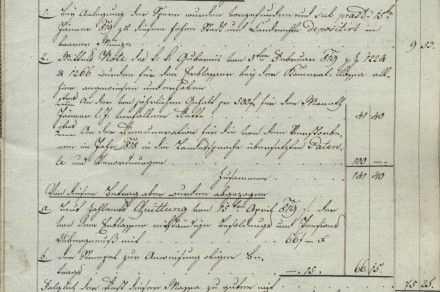»No Daughter, No Son Will Follow Me, Memory is Enough: Songs Sung of Me«
Probate Inventory Taken After the Death of Valentin Vodnik
Valentin Vodnik (born on February 3, 1758 in Zgornja Šiška), the great Slovenian poet, pedagogue, journalist and linguist, died of stroke at the age of 60 late on the evening of January 8, 1819. At the time he was renting an apartment at Keršbaum in the Capuchin suburb (today this is the area around Kongresni trg). When Vodnik suddenly felt faint during dinner, his charwoman Eva Vučer ran to get the doctor Anton Melcar, who was unable to save Vodnik. Around eleven in the evening his soul left his body and two days later he was buried at the Church of St. Christopher in Bežigrad.
Probate proceedings began a week after Vodnik had died. The proceedings produced a 140-page long probate record, which today is kept among the records of the Ljubljana Provincial Court. Vodnik’s assets were immediately blocked and his movable goods were being diligently listed and valued. On April 24, 1819, the work was completed and his property was estimated to be worth 3994 Gulden and 22 ½ Kreuzer.
The probate inventory was taken by the inventory commissioner Wenzel von Gandin with the assistance of four appraisers and in the presence of two witnesses. Apart from cash, valuables and clothes, the commission also listed furniture and objects in individual rooms. Vodnik lived in a small two-bedroom apartment, which also included a kitchen, pantry and some space in the basement. A substantial part of his apartment was taken by his extensive library collection – almost 500 books and manuscripts – and his valuable collections of 362 coins and 368 minerals. The summary of the estimated property at the end of the inventory paints a picture of a fairly good financial condition of the deceased:
- cash: 85 Gulden 18 Kreuzer,
- valuables: 25 Gulden 49 ¼ Kreuzer,
- money in securities: 3481 Gulden 5 ¼ Kreuzer,
- manuscripts and papers of no value : /
- men’s clothes and linen: 66 Gulden 52 Kreuzer,
- furniture and dishes: 96 Gulden 53 Kreuzer,
- books: 92 Gulden 19 Kreuzer,
- collection of coins: 58 Gulden 46 Kreuzer,
- collection of mineral: 87 Gulden 20 Kreuzer.
According to the inventory record, Vodnik’s brother Anton and his sisters Jera and Uršula came forward to claim his inheritance. However, since Vodnik had been a priest, two thirds of his effects were to go to the Church and to the poor, according to the then Austrian legislation, which is why the Chamber Prokuratura (present-day Attorney General) also came forward as a representative of the Church and the poor in Koprivnik in Bohinj, where Vodnik served as a vicar for three years.
Vodnik’s property was sold at the auctions between 1819 and 1820, yielding 943 Gulden and 1 Kreuzer. His collection of minerals was sold to Mešutar, the headmaster of the elementary school, for a very low price of 30 Gulden.
After paying off considerable debt and court expenses, Vodnik’s assets amounted to 1336 Gulden 57 ¾ Kreuzer, which was divided in thirds (445 Gulden 39 ¼ Kreuzer), of which one third was received by the church in Koprivnik, one third by the poor in Koprivnik and one third by Valentin Vodnik’s siblings Anton, Jera and Uršula.
Vanja Rupnik



